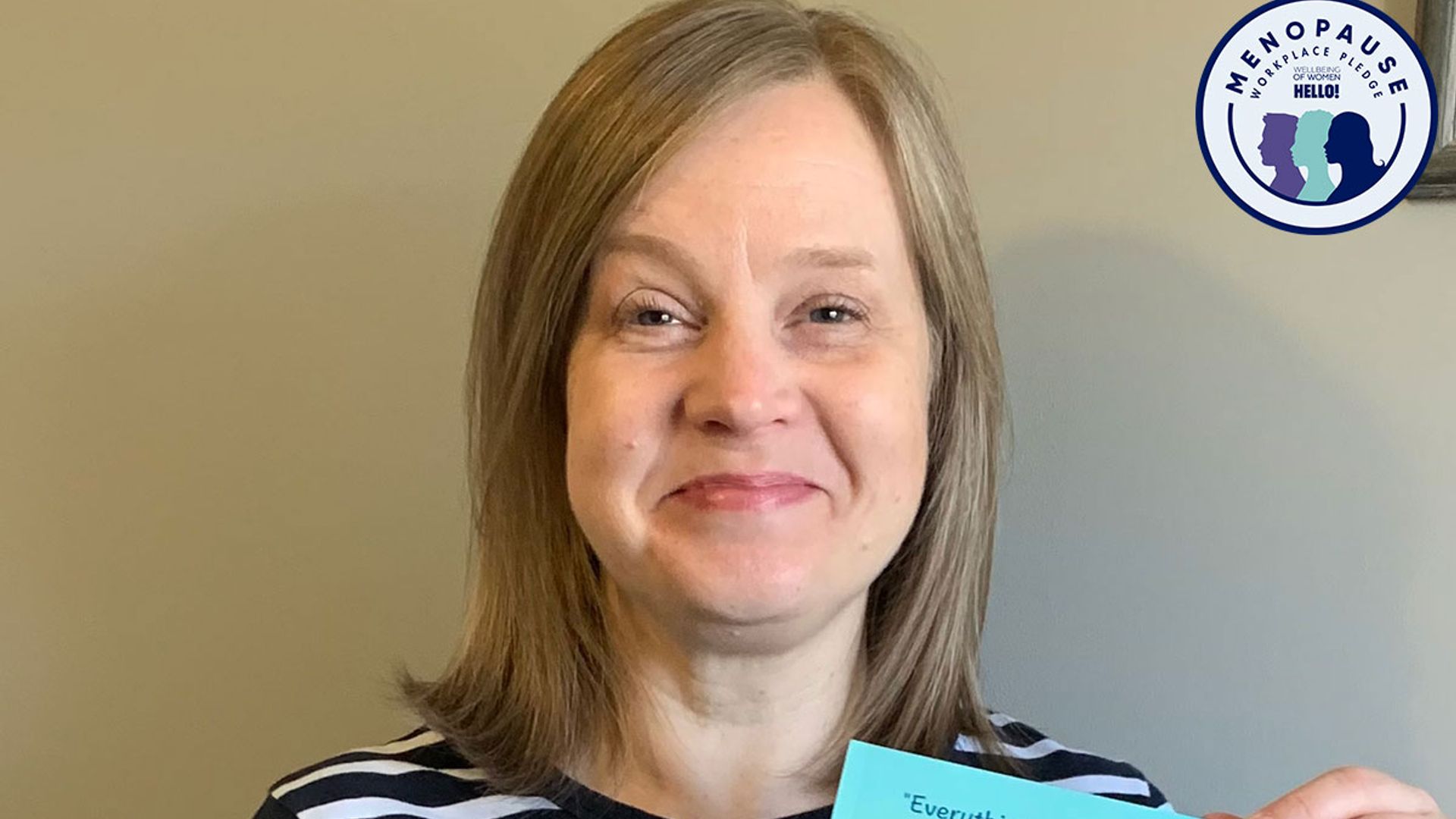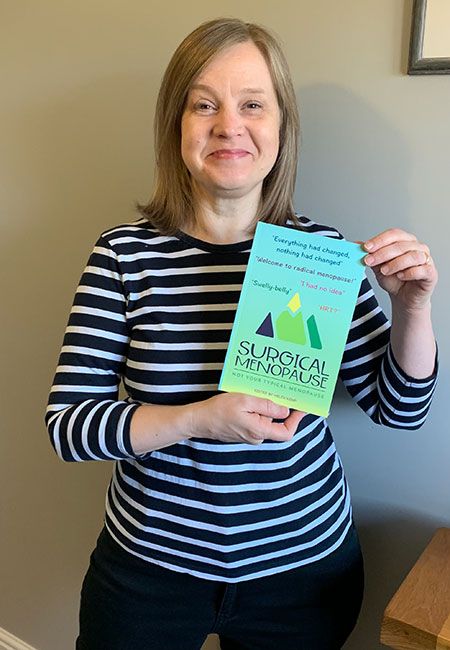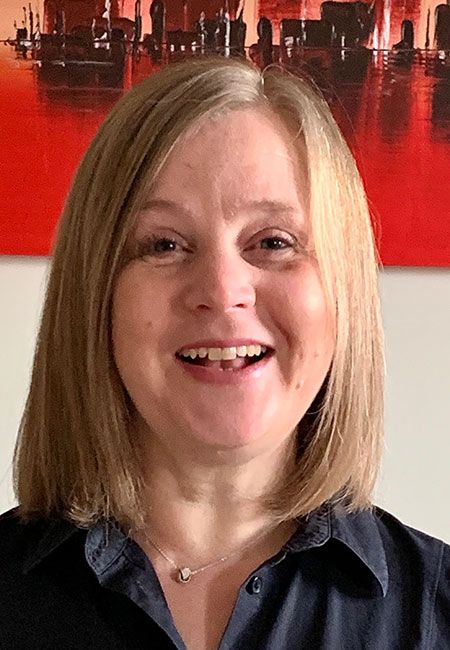A study has shown that 900,000 women in the UK have quit their jobs because of the menopause. These numbers are a stark reminder of the lack of support in place for women going through the menopause in the workplace, and Barbara Claypole, 49, a former customer support manager from Hertfordshire who now works with charity Wellbeing of Women, is just one woman who felt they had no choice but to give up their career. She began showing symptoms of the menopause at 44 years of age before going in for a hysterectomy at 46, and quit her job just a few months later despite building up a career for 20 years. She shared her story with HELLO!.
SEE: A guide to menopause employment law: menopause leave, existing menopause workplace policies and more
"The moment I realised I couldn't work anymore was when I asked for help and some flexibility in my role and was spoken to by my manager and a member of HR as though I were an under-performing manager. Not like the high performing manager who I had always been who now just needed some support.
"I wanted empathy – not sympathy. A few breaks in a back-to-back diary so I could go to the bathroom regularly or go outside if I needed to cool down or clear my head. I managed the largest team in my department, so I asked if there was any possibility of some of my more experienced staff assisting short term with some of my more basic duties or delegating more to my team members who all said they were happy to help. My staff had commented about the fact I had the biggest team to look after even before my surgery which meant I was often much busier than a lot of my peers.
"But my manager refused to be flexible at all about my role moving forward saying the role was fine as it was and wouldn’t be changed, even in the short term. I was told that I should be able to do it all without changes or help.
SEE: 36 symptoms of menopause and how to treat them – expert advice
MORE: Penny Lancaster breaks down as she details menopause and husband Rod Stewart's role - watch
Barbara is co-author of a book about surgical menopause
"The problem was, while the role was the same, I wasn't. Managing staff and making decisions became very challenging when I had severe anxiety and a loss of confidence. Attending meetings when you have brain fog and can’t remember things like you used to can feel overwhelming. Plus having a back-to-back diary following hysterectomy surgery and a surgical menopause was very challenging due to issues with your pelvic floor and the need to use the bathroom more often than you used to. Not to mention the hot flushes when you are in meetings which affects your confidence, and becoming self-conscious about looking hot and flustered makes you feel extra emotional.
"It was up to me to try and adapt my working day to make it easier for me. I made sure that I always had cold water to try and help with hot flushes and I bought myself a portable fan for my desk. I made sure that I took more notes than usual in meetings, so that I wouldn’t forget important things to do. I tried to ensure I had some breaks in my diary so that I could use the bathroom and go outside for fresh air if I needed just a few minutes to clear my head. Unfortunately, my manager usually filled any small breaks in my diary with additional meetings despite the fact I explained why I needed them.
RELATED: Penny Lancaster discusses 'horrific' menopause symptoms in candid interview
Barbara quit her job a few months after starting the menopause
"All that said, the staff I managed were amazing. They offered me support and kept me going when I first went back to work after my surgery. Another senior manager, who happened to be male, also took me to one side and said he could see I was struggling. His wife had been through the menopause, and he recognised the signs. But he didn’t work in my department so other than talk to me and be kind he couldn’t really offer any practical help.
"When I finally came to leave, I made it clear to HR and in my exit survey exactly why I was leaving. They seemed relieved, and I definitely felt a sense of relief. I wouldn’t have to struggle unsupported every day. But it also was difficult as it really affected my self-confidence and I had feelings of failure that I had to even ask for some help, as this was something I had never had to do at work before. I was always the one to offer help to others.
"I wish more employers knew that the menopause is something so many women struggle with, and often try to hide from them for fear of being singled out as underperforming. By the time most women are brave enough to ask for help they are desperate, and it has taken a huge amount of courage for them to speak about such a personal matter. I would say to employers that ensuring you have a culture where the women that need support can talk about menopause openly without discrimination or a lack of awareness by managers would mean all their female talent could be retained in their organisations.
READ: Davina McCall shares glowing make-up free selfie with important menopause message
"In an ideal world, the existence of a more formal Menopause Policy would help ensure women are supported and not discriminated against. In all organisations, however, I think menopause champions are a great idea be and can be put in place to ensure women have a safe space to speak about their symptoms or how it may be affecting their performance at work. HR departments should ensure they have an awareness of menopause so that they can support staff who may need some flexibility or just someone to talk to if they can’t speak about this matter with their direct line manager.
"Now, a year after quitting my job, I feel proud that I put my wellbeing first. I have gone on to build networks of amazing women who have all been in the same position as me. These women have given me my self-confidence back. So much so that I collaborated with a group of these women and became a co-author in a book about surgical menopause. I told my story to help other women in the future who are going to have surgeries that will result in a surgical menopause. I am now a committed menopause advocate and am proud to speak about my experience in the hope it helps change things for other women in the future.
"I have also been doing some freelance menopause awareness work and volunteering to help support women in the workplace, so perhaps this may become a permanent new career path for me. One thing is for sure, and that’s that I will certainly keep mentoring and championing women whatever my future working life looks like."
Like this story? Sign up to our newsletter to get other stories like this delivered straight to your inbox.










